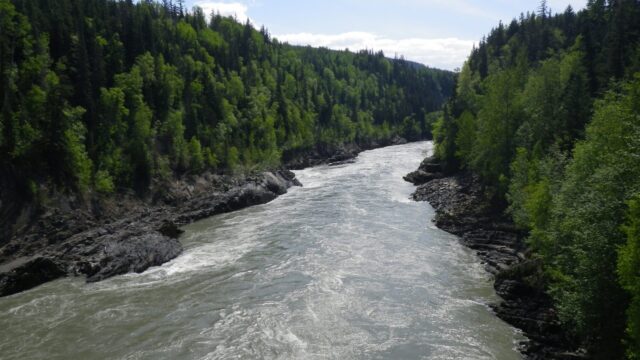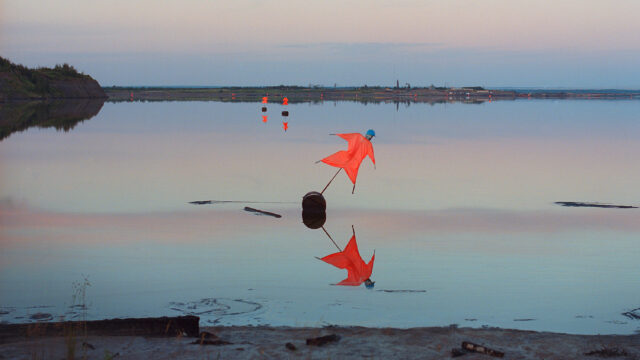Last June, the federal government announced sweeping reviews of key environmental laws and called on concerned individuals, communities, and organizations like Ecojustice to give thoughts on how to strengthen them.
Ecojustice has seized the opportunity to contribute to decisions that affect our communities, climate and the environment. We’ve participated in each review that has taken place so far: the Canadian Environmental Protection Act, the Fisheries Act, the Canadian Environmental Assessment Act and the Navigation Protection Act.
In late March, I went before the expert panel appointed to review the National Energy Board’s (NEB) structure, role and mandate under the National Energy Board Act to present our thoughts on how the NEB can modernize its processes.
Read below to learn more about our latest submission.
What is the National Energy Board?
The NEB is Canada’s energy regulator. It conducts research, shares information, regulates certain energy projects, and determines whether projects under its jurisdiction are in the “public interest” — a term the National Energy Board Act does not define.
Despite its responsibility to act in the public interest, we have seen the NEB recommend approving a number of pipeline projects that will have a tremendous impact on nature, our communities and the climate.
Ecojustice has represented environmental groups in the NEB review of each major pipeline project that has been proposed in the last ten years: Enbridge’s Northern Gateway pipeline, Kinder Morgan’s Trans Mountain Expansion project and TransCanada’s Energy East pipeline. We know how pipeline reviews tend to stack up — in general, the process has gone from bad to worse.
If the government wants to modernize the NEB and rebuild its credibility, it will have to make deep changes.
The issue: Amendments and rollbacks
Let’s back up to 2012. During that year, the Harper government attempted to fast track approvals for proposed pipeline projects by hollowing out environmental laws, including the National Energy Board Act. The 2012 amendments weakened and politicised the regulatory regime, eroding public trust in the system.
Today, the NEB is riddled with systemic failures. Some of the most glaring problems include, no flexible timelines for reviews, lack of inclusive public participation, and limitations on public hearings such as no cross-examination and no meaningful consideration of climate change impacts.
The badly flawed hearings on Kinder Morgan’s Trans Mountain Expansion project and the recusal of Energy East pipeline review panel underscore the need for change.
The changes that need to happen
- Mandate and regulatory framework
When the Harper-government’s environmental law rollbacks came into effect, the responsibility for environmental assessments of energy projects was assigned to NEB alone — where previously the NEB and the Canadian Environmental Assessment Agency would perform the task together. This has proven to be a real problem.
The NEB, as we’ve come to know it, is dominated by industry insiders and conventional industry perspectives. As a result, it fails to objectively evaluate the need for, and the consequences of, new oil and gas projects. As we transition to a decarbonized energy system in which we are less likely to build new oil and gas infrastructure, the NEB’s role — chiefly concerned with regulating oil and gas and in particular interprovincial and international pipelines — should diminish. In other words, the NEB should get out of the business of environmental assessment.
As we recommended in our submission to the expert panel on environmental assessments, we need a single regulatory body at arm’s length from departmental mandates and partisan political interests to be responsible for environmental assessment. These “next-generation” assessments should set out criteria focused on sustainability that inform the “public interest” test. The NEB’s function should be limited to technical matters traditionally within its regulatory expertise (related to pipeline safety, for instance). It could also turn its attention to technical plans for decommissioning and remediating energy infrastructure, such as pipelines, that are redundant in a decarbonizing economy.
- Public participation
If we want to ensure that a project is approved based on whether it is in the Canadian public interest, then we need to consider broadening the scope of who can participate. All interested parties should have a chance to contribute, instead of the current approach of only including participants who are “directly affected” by local impacts. When more people have the opportunity to give input, decision-makers have access to relevant evidence from broader parts of Canadian society.
- The hearing process
We need to ensure that there is sufficient review of evidence during the hearing process. Again and again, Ecojustice’s experience in the courtroom and before regulatory review panels has demonstrated the importance of oral cross-examinations. It is the most thorough way to test evidence.
During the review of Kinder Morgan’s Trans Mountain Expansion project, the NEB inexplicably removed oral cross-examination as a component of the hearing and instead relied on written questions and answers as a means to test evidence. The absence of cross-examination left the door open to unanswered questions and numerous motions challenging the adequacy of written responses.
- Decision-making roles on projects
The arbitrary timelines in the National Energy Board Act for major project reviews should be removed so that the evaluation of complex projects is not rushed. Where necessary, a panel could set timelines beyond a set minimum to allow for review of project descriptions, environmental impact statements and technical reports by interveners and their consultants.
- Safety and environmental protection
Long-term safety and environmental protection are important and can be achieved through meaningful follow-up and compliance monitoring. As we’ve said before, conditions of project approval should be binding and enforceable and information on follow-up and monitoring should be publicly available.
Looking ahead
The federal government has before it a once in a generation opportunity to get it right by strengthening Canada’s environmental laws to comprehensively protect nature, our communities and the climate. Ecojustice will continue its push to ensure that the government uses these reviews to their full potential and achieves real change.




